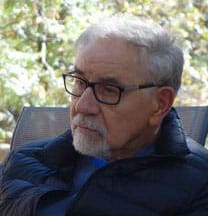When Rabbi Steve Greenberg was a young rabbinical student at an Orthodox Yeshiva near Jerusalem in the mid-1970s, he was attracted to a fellow (male) student. He wanted to talk about his feelings of homosexual desire to a respected old rabbi — but was afraid to. So Greenberg fudged by telling the rabbi he was “attracted to both men and women.” The venerated old rabbi shrugged: “So you have twice the power of love. Use it carefully.”
Greenberg recounted this anecdote to an audience of about 100 at Pasadena Jewish Temple & Center (PJTC), a Conservative synagogue where he was warmly received this past weekend. He talked about his remarkable personal journey, carefully using his “power of love” — his rabbinic insight, humor and dynamic lecture style — to impart what he’s learned about inclusiveness, having navigated the tricky waters of being a gay rabbi in the Orthodox world.
Greenberg cited the passages from Leviticus that caused him anguish when he was young: “Do not lie with a man as one lies with a woman; that is detestable.” “If a man lies with a man as one lies with a woman, both of them have done what is detestable. They must be put to death; their blood will be on their own heads.”
During Greenberg’s rabbinical student days at New York’s Yeshiva University, reciting these passages — especially since they’re said on Yom Kippur — caused him so much pain that he covered his head with his tallit so that others wouldn’t see his tears or emotions. He’s struggled much of his adult life to explain this basic question: How can one be an Orthodox Jew, believing and following what is written in the Tanakh, and be homosexual?
In 1999, in his 40s, he decided that “it’s worse for a man to have to live with the shame and depression of not being who he really is than to suffer the consequences of being himself.” He came out, writing a published article about his sexuality.
At PJTC, Greenberg talked about how he reads those Leviticus passages now. First, he analyzes the reasons for the condemnation of homosexuality. 1.) Reproduction: A homosexual will likely not be a parent, which goes against the biblical command to be fruitful and multiply. 2.) Social confusion: When relationships go against traditional behavior, people have limited tolerance levels. 3.) Gender confusion: Many feel discomfort in the presence of cross-dressers or feminine boys, for example, because it throws traditional gender definitions into disarray. He refuted all these reasons as a basis for condemning homosexuality.
Then Greenberg zeroed in on reading the Leviticus passages in a novel way.
He said that the passages are really about sexual violence. He cited how the words of the passages are used elsewhere and concluded they’re about someone exerting power over another by violent, forcible penetration: “Abu Ghraib-type sexual violence.” Because anal rape of a man is a way of emasculating him, the Leviticus passages are a condemnation of violence, rape and sexual debasement.
Greenberg acknowledges that he interprets the passage this way “because it offers me a way of coming back to Judaism. It’s a radical reading, but if you believe that God hates what you are, why would you go to such a temple?
“Imagine someone going to an Orthodox synagogue and saying, ‘Rabbi, I’m gay. What does Hashem want from me? Lifelong celibacy?’ A rabbi can’t say: ‘OK, we welcome you, but our God thinks that what you are is abhorrent.’ Instead, he might say: ‘OK, keep the other 612 commandments, and we can let that one go.’ ”
Whatever the Orthodox community’s attitude toward homosexuals, Greenberg believes that’s not enough reason for him to leave the fold.
“Choosing a religious commitment,” Greenberg said, “is similar to choosing a life partner or shul to belong to. We base that decision on those things we love — and there are plenty in Orthodox Judaism — and on the weaknesses we can live with.”
For nearly 30 years, Greenberg has been working with CLAL, National Jewish Center for Learning and Leadership, where he’s now Director of Diversity Project and Senior Teaching Fellow.
“There are two different tasks when it comes to inclusiveness and diversity,” Greenberg said. “One for the Orthodox, one for the liberal community.”
Liberal communities have issued welcoming statements, he said, but they should do more. Welcoming the stranger should be more than political correctness.
“It means thinking through how the curriculum is built for the Hebrew school, how the policy works in synagogue membership, what kind of anti-bullying program has been put in place in the school, what is the language teachers commonly use when dealing with questions of gender and sexuality, and do they make room for two dads or two moms when they’re teaching preschool and kindergarten kids?”
For the Orthodox community, Greenberg said, the task is to “broach the problem with an awareness of the human circumstances. There’s reason to believe that, in time, perhaps in 20 or 30 years, the Orthodox community will recognize our Jewish responsibility for welcoming ‘the other,’ the person who doesn’t ordinarily fit, the person on the margins. I think there’s a great deal of hope that will change, so we can at least stop the witch hunt and find a way to make our community broader and richer and more caring of everyone.”























 More news and opinions than at a Shabbat dinner, right in your inbox.
More news and opinions than at a Shabbat dinner, right in your inbox.